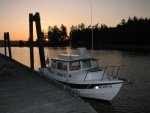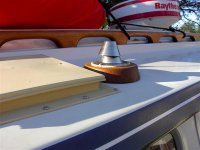Actually, most boat explosions are caused by gasoline…
https://www.boatus.com/seaworthy/magazi ... aboard.asp
As the original poster for this thread I was careful not to mention propane, as the merits of propane vs. diesel was not my question, and I knew the p word wold derail the post. So my bad for responding to someone’s question re. what kind of furnace I was considering, and thus allowing this to happen. In retrospect that’s not so bad, as I think it’s good that any thread that discusses the use of propane also discusses how to use it safely.
There are protocols for using all of these energy sources safely and, if you don’t follow them, you are setting yourself up for a heap of trouble. Carelessness causes accidents, not gasoline or propane or electricity, all of which can be deadly. Personally I am satisfied that I can safely use propane aboard my boat, as I have safely used it on my RV for decades. I believe I understand what is required to do so and am capable of implementing a safe propane installation.
If anyone else comes upon this thread and wants to learn more about how to use it safely here's some information to get you started. The first is an intro, the second two go into more detail, and the fourth is a copy of the ABYC requirements:
https://www.westmarine.com/WestAdvisor/ ... tallations
https://www.passagemaker.com/lifestyle/ ... and-safety
https://www.passagemaker.com/lifestyle/lp-gas-systems
https://archive.org/stream/gov.law.abyc ... 3_djvu.txt
Everyone I personally know who owns a cruising boat (only two as I’m new to this so I don’t have many boat friends yet) uses propane on their boats. One is a Grand Banks and the other is a Tollycraft. I believe propane came standard with these boats, as it does on Ranger Tugs, which many are familiar with. I’m guessing there are millions of RVs on the road in this country that use propane.
There is no question that propane is a dangerous substance, as are gasoline, natural gas, and electricity. Propane is more dangerous than gasoline because propane is heavier than air, and will sink to the bottom of a bilge, cabinet, etc. whereas gasoline fumes will rise and are much more likely to dissipate if conditions are right. Diesel is inherently much safer than either because it is not explosive at room temperatures.
The bottom line in is that there are lots of careless people out there. Every time I go to the Garibaldi marina, I shudder to walk by the commercial fishing vessels and look inside the cabin windows. Besides crap piled everywhere there is often a propane bottle, not in a locker, attached to a catalytic heater and a stove. These are the situations that make the news and give propane a bad name.
Most of us are comfortable being around gasoline, natural gas, diesel, and electricity because we use one or more of these daily and society in general is comfortable with them, despite spectacular failures. Unfortunately, I witnessed a car fire and explosion two days ago, yet I am not afraid to drive my car today. In part because I believe I will not make the mistake that caused that event, but also in part because I’ve become comfortable driving around with 20 gallons of gasoline under me.
Unless you live in a rural area like me, where most people heat and cook with propane, your only exposure to propane is likely the evening news. If you aren’t comfortable with propane, or don’t feel you can use it safely, then DON’T USE IT. It is not to be trifled with!
Thanks again for the suggestions in response to my original post. And thank you to those who took the opportunity to ensure that readers of this post are aware of the requirements for using propane safely.








